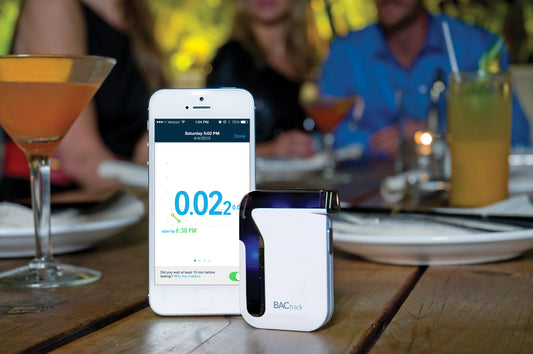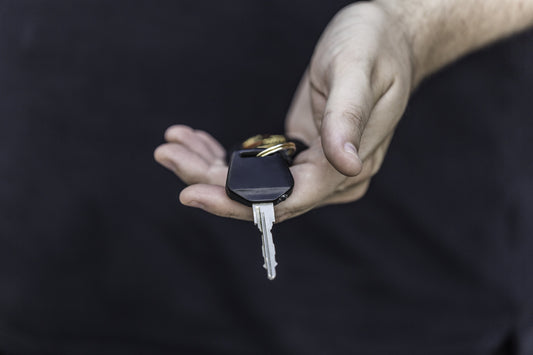Are Breathalyzers Accurate?
Are Breathalyzers Accurate?
In every state in the U.S., a driver with a blood alcohol content (BAC) of 0.08% or higher is presumed to be legally intoxicated and may be charged with driving under the influence (DUI). But what is the best way to determine that BAC?
There are three methods of BAC testing normally used in the U.S., the most accurate method being a blood test. However, blood tests are inconvenient and invasive; a blood sample must be drawn from subjects’ veins in a hospital or clinical setting. As a result, breath tests using handheld devices, also called “breathalyzers” and "preliminary breath testers" (PBT), are employed in the field by law enforcement to assess BAC because they are lightweight, portable, and easy to administer. These same qualities make them great for use by concerned individuals wanting to monitor their alcohol level.
The most accurate method of determining BAC is a blood test. However, blood tests are inconvenient and invasive.
While breath test results may help an officer establish probable cause for a DUI arrest, they are not admissible in court. A number of factors can influence breath test results, and many attorneys make a living challenging the reliability of breathalyzers on behalf of clients charged with DUI.
In recent years, breathalyzer prices have declined while breath testing technologies have improved. Increasingly, consumers are purchasing breathalyzers to gauge their own BAC levels after consuming alcohol, as well as to monitor underage children with driving privileges or family members who have alcohol issues.
As personal and professional applications for breathalyzers expand, it’s fair to ask: Do breathalyzers deliver accurate results?
Breathalyzer Sensor Technologies
All handheld breathalyzers work essentially the same way: You blow into a breathalyzer mouthpiece and the breathalyzer provides a “reading” of your BAC. However, breathalyzer technologies and their accuracy vary. Your decision to purchase one or the other depends on your particular needs.
Breathalyzers can generally be grouped into two categories: breathalyzers with semiconductor sensors for personal and home use; and professional-grade breathalyzers, highly accurate devices that use fuel cell technology.
Semiconductor Sensor Technology
Traditionally, most breathalyzers have used semiconductor sensors to measure BAC. Semiconductor sensor technology often involves a tin-oxide material, which is less expensive – and less accurate – than platinum fuel cell sensor technology.
Semiconductor sensors are subject to false positives from substances such as ketones. But for personal, home, and low-volume professional testing, they are sufficiently reliable.
Semiconductor sensors are subject to false positives from substances such as ketones (naturally occurring bodies produced when fat cells break down in the blood) that are similar in chemical structure to alcohol. Semiconductor devices can also react to cigarette smoke, breath acetone, and chemicals such as hairspray. For personal, home, and low-volume professional testing, semiconductor models perform well and provide readings that are sufficiently reliable.
BACtrack has developed its own proprietary brand of semiconductor sensor technology, called MicroCheck®. These sensors perform at a higher level and with more accuracy than standard semiconductor sensors because of a patented burn-in process that equalizes its response. BACtracks with MicroCheck Sensors include the BACtrack S35, BACtrack Vio, BACtrack Go and BACtrack T60.
Fuel Cell Sensors
Breathalyzers with fuel cell sensors are more sensitive than semiconductor breathalyzers and provide extremely accurate readings. In recent years, they have come down greatly in price, while still offering a very high level of performance. Fuel cell breathalyzers are used by individuals desiring the highest level of accuracy, as well as law enforcement officers for roadside screenings, in substance abuse centers, clinics, and in businesses.
Breathalyzers with fuel cell sensors are more sensitive than semiconductor breathalyzers and provide extremely accurate readings. They are also not subject to false positives when used by diabetics or those on a low calorie diet.
At higher BAC concentrations, fuel cell sensors offer more accurate readings than traditional semiconductor sensors. They are also not subject to false positives when used by diabetics or those on a low calorie diet. Overall, they are the best, most accurate devices an individual can purchase because they deliver a high degree of reliability. All BACtrack Professional Grade Breathalyzers are equipped with Xtend® Fuel Cell Sensors.
Factors that Can Affect Breathalyzer Accuracy
Nevertheless, one should always be aware that a breathalyzer is a machine that can be influenced by outside factors if the user is not careful. Here are just a few than can potentially cause errors:
- Foreign Substances – Substances present in the mouth that contain alcohol can produce false positives because the amount of alcohol vapor they emit may be greater than the amount exhaled from the lungs. For example, some mouthwashes, breath fresheners, and toothache medicines contain alcohol and can skew readings.
- Calibration – Breathalyzers must be calibrated periodically and batteries must be replaced in order to maintain accuracy. Read more about breathalyzer calibration.
- Software – Breathalyzers run on special software, just as computers rely on operating systems, which can result in occasional bugs and glitches.
- Human Error – As easy as breathalyzers are to use, they still require some attention to detail.
- Consistency – To ensure accuracy, breath tests should be performed multiple times to produce a reliable result. Breathalyzers that utilize fuel cell sensor technology provide the most reliable and accurate results in repeated tests.
- Environmental Factors – False results can be triggered by the presence of paint fumes, varnish, and chemicals such as plastics and adhesives.
Accuracy You Can Depend On
BACtrack puts each of its products through rigorous testing to ensure the very highest quality, and most accurate results possible. We use carefully-engineered technology to deliver reliable, consistent BAC results, with unparalleled precision. Read more about the Accuracy Testing BACtrack conducts regularly to ensure highest customer satisfaction.
Not only that, BACtrack stands behind every product we sell with a one year warranty. That's accuracy you can depend on.
Shop for BACtrack Breathalyzers now.





